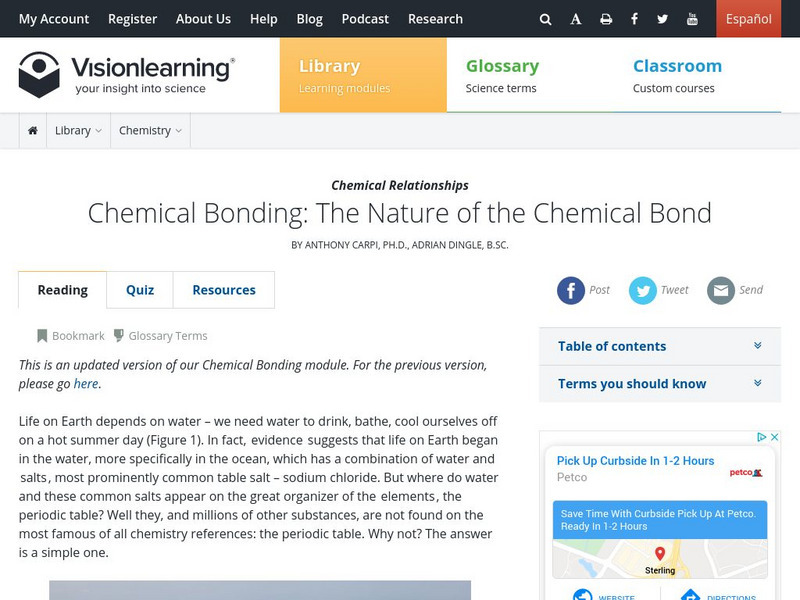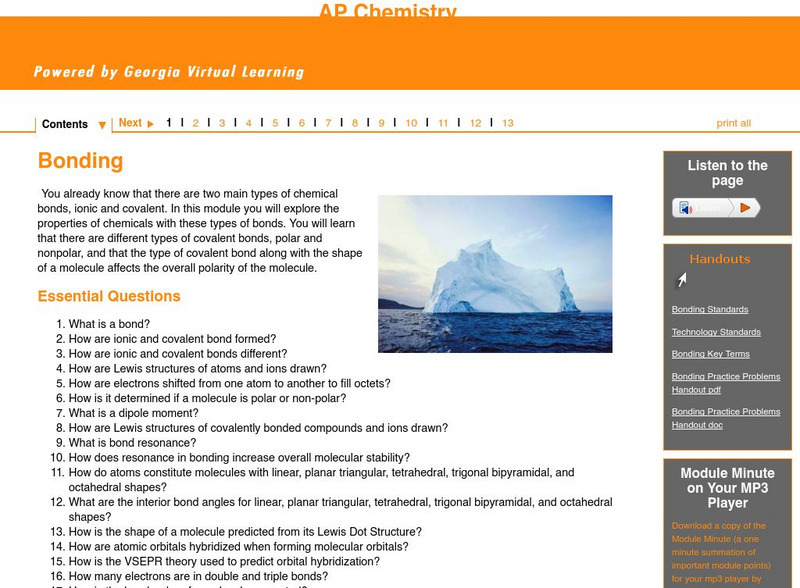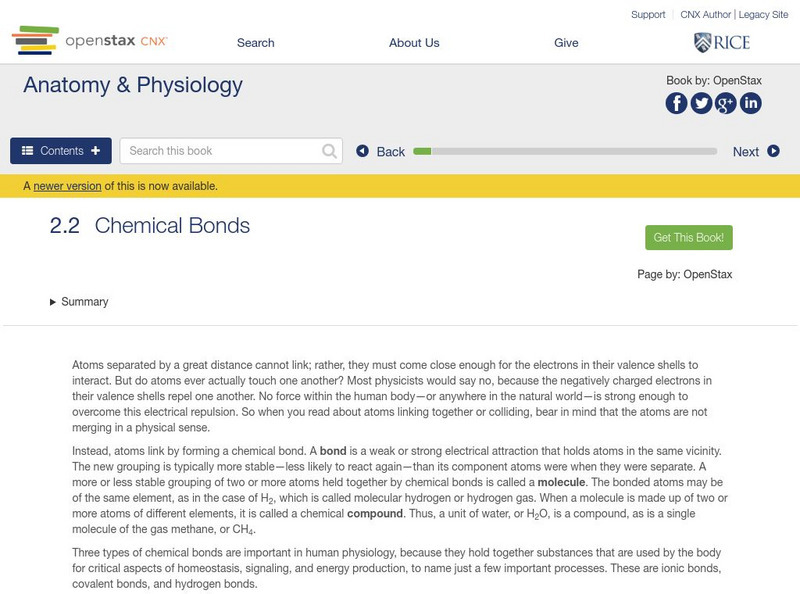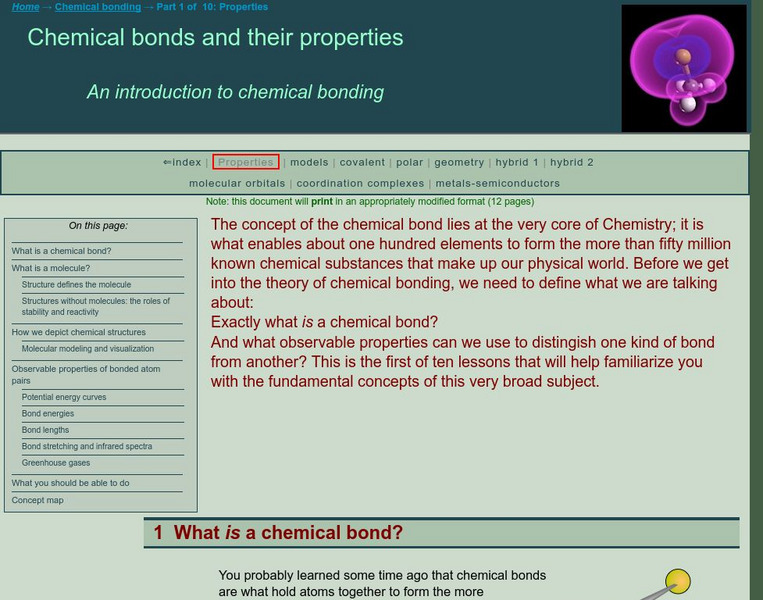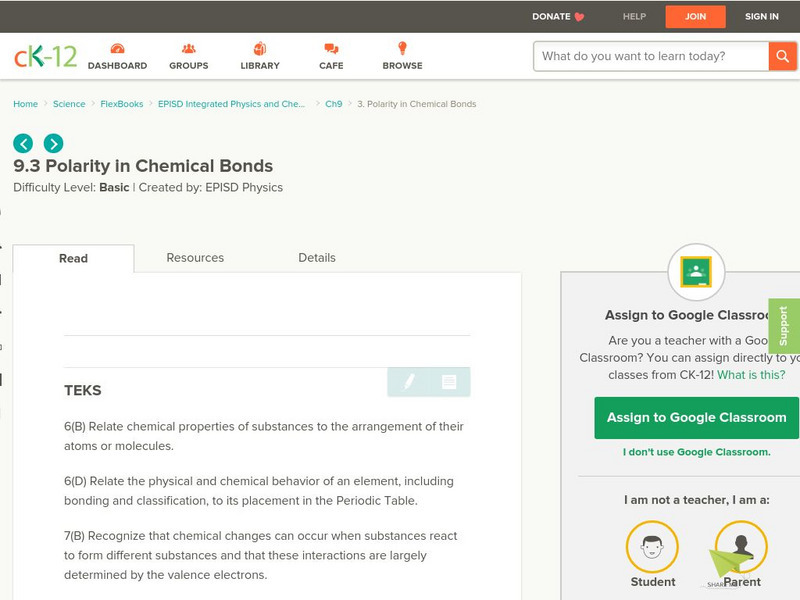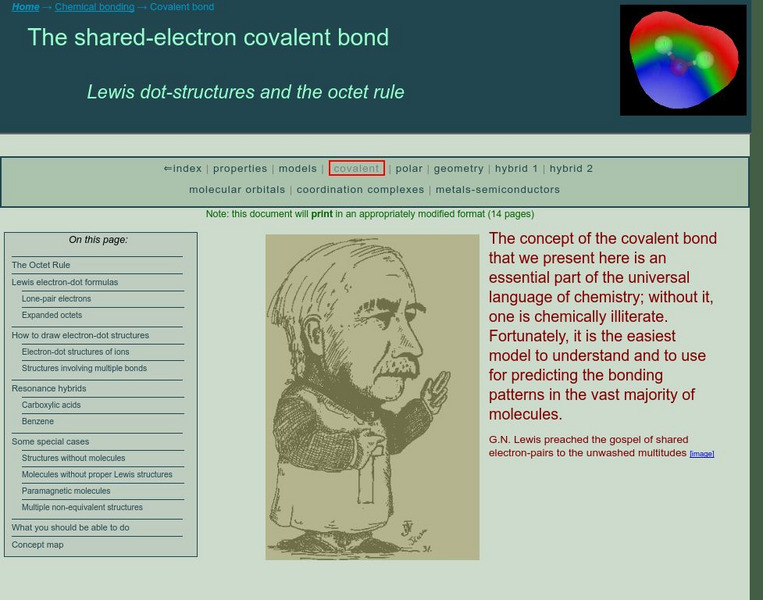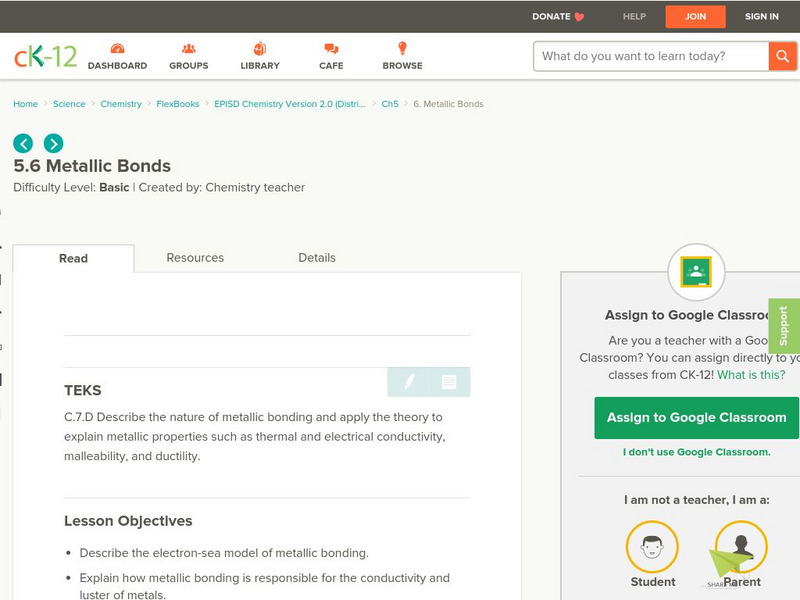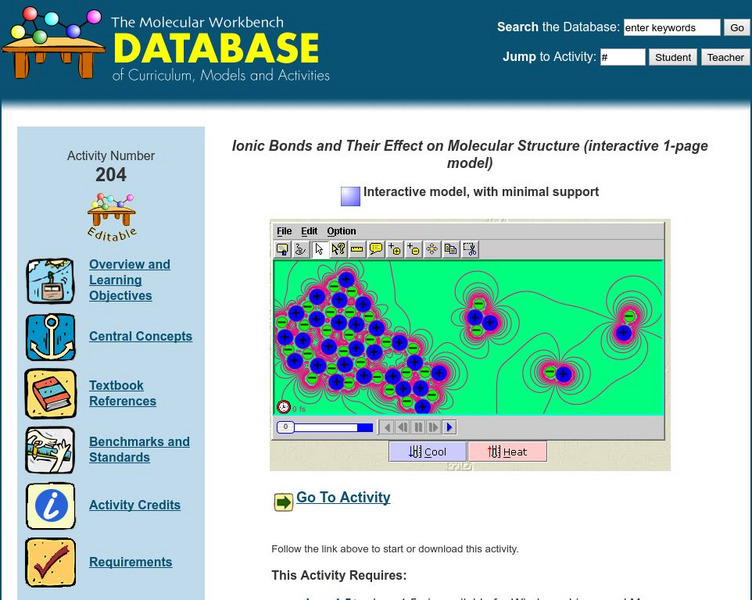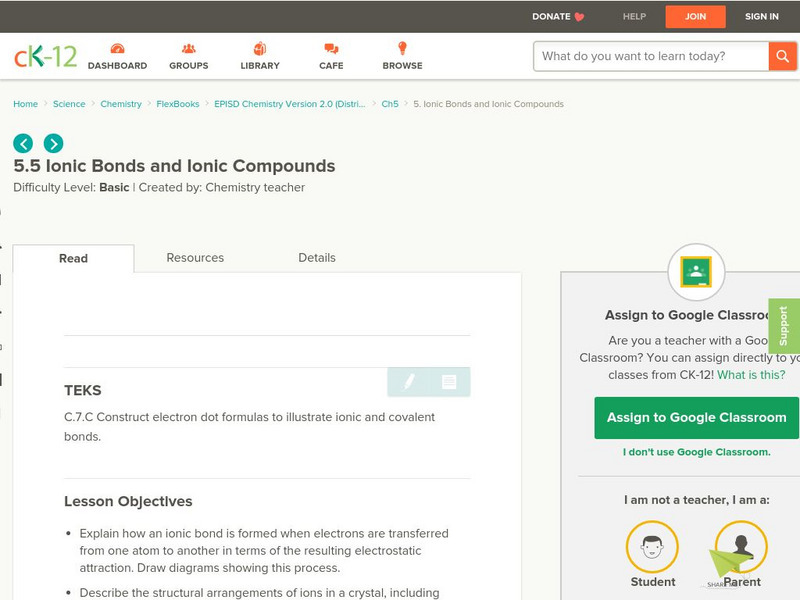Vision Learning
Visionlearning: Chemistry: The Nature of the Chemical Bond
This site talks about ionic, polar covalent, and non-polar covalent bonding.
Concord Consortium
Concord Consortium: Stem Resources: Chemical Bonds
By working through this web-based activity, students differentiate between ionic, non-polar covalent, and polar covalent bonds. Specifically, distinctions are made between bonding types based on orbital shapes and electronegativity...
Khan Academy
Khan Academy: Single and Multiple Covalent Bonds
Explains what covalent bonds are and the difference between them and ionic bonds. Discusses the properties of polar and non-polar covalent bonds, and single and multiple covalent bonds, and gives analogies and examples of how covalent...
Texas Education Agency
Texas Gateway: Ionic and Covalent Bonding
In this tutorial, students learn about ionic and covalent bonds and predict which elements will form which type of bond. Includes interactive exercises as well as videos.
PBS
Pbs Learning Media: Chemical Bonds
This interactive activity developed for Teachers' Domain demonstrates how attractive forces between atoms create chemical bonds, resulting in the formation of molecules and compounds.
Georgia Department of Education
Ga Virtual Learning: Ap Chemistry: Bonding
In this module students explore the properties of chemicals with covalent and ionic bonds. Students learn that there are different types of covalent bonds, polar and nonpolar, and that the type of covalent bond along with the shape of a...
Khan Academy
Khan Academy: Biology: Chemistry of Life: Chemical Bonds
Review over covalent, hydrogen, and ionic bonding in this article. Learn how molecules are held together by chemical bonds.
OpenStax
Open Stax: Chemical Bonds
Learn here about chemical bonds, a weak or strong electrical attraction that holds atoms in the same vicinity.
PBS
Pbs Learning Media: Ionic Bonding
In this interactive activity from ChemThink, students will learn how ionic bonds are formed and how an ionic bond structure is represented by its formula.
University of Colorado
University of Colorado: Ph Et Interactive Simulations: Covalent Bonds
Explore tunneling splitting in double well potentials. This classic problem describes many physical systems, including covalent bonds, Josephson junctions, and two-state systems such as spin 1/2 particles and ammonia molecules. Java...
PBS
Pbs Learning Media: Covalent Bonding
This interactive activity from ChemThink takes a closer look at a covalent bond: how it is formed and how the sharing of two electrons can keep atoms together.
Concord Consortium
Concord Consortium: Molecular Workbench Showcase: Chemistry, Chemical Bonds
Simulations to show students the nature of chemical bonds. Simulations include an explanation of stereochemistry, atomic orbitals, chemical polarity, formation of an atom, and a summary quiz.
Simon Fraser University
Chem1 Virtual Textbook: Molecules and the Properties of Bonded Atoms
College-level site goes into great detail about chemical bonding properties, as far as energies, structure, angles, and length. Infrared absorption, the greenhouse effect, and global warming are addressed to exemplify bond length...
CK-12 Foundation
Ck 12: Polarity in Chemical Bonds
[Free Registration/Login may be required to access all resource tools.] Students will determine the polarity of a chemical bond using the electronegativity chart, and then distinguish between nonpolar covalent, polar covalent, and ionic...
American Chemical Society
Middle School Chemistry: Energy Levels, Electrons, Ionic Bonding
Students discover that ionic bonding occurs when electrons are transferred from one atom to the other and not shared as in covalent bonding.
American Chemical Society
Middle School Chemistry: Energy Levels, Electrons, and Covalent Bonding
Students discover the concept that two atoms can attract and form a covalent bond.
Simon Fraser University
Chem1 Virtual Textbook: The Shared Electron Covalent Bond
The General Chemistry Virtual Textbook, or Chem 1, is broken into several sections covering various aspects of topics related to chemistry. This section deals with the shared-electron covalent bond and related topics such as the octet...
CK-12 Foundation
Ck 12: Metallic Bonds
[Free Registration/Login may be required to access all resource tools.] In the following online tutorial, students will begin to describe the electron-sea model of metallic bonding. They will explain how metallic bonding is responsible...
Georgia Department of Education
Ga Virtual Learning: Physical Science: Bonding and Chemical Reactions
Through informational text, interactive puzzles, and review questions, students differentiate ionic and covalent bonds and identify the properties of each. They also use oxidation numbers to predict formulas of ionic compounds, name...
Utah Education Network
Uen: Conductivity and Bonding
Students will measure the conductivity of several compounds and solutions in order to predict the bond types (ionic or covalent) in the substances tested.
Concord Consortium
The Molecular Workbench Database: Ionic Bonds
In this simulation observe ionic bonds and how they affect the structure of the molecule.
CK-12 Foundation
Ck 12: Ionic Bonds and Ionic Compounds
[Free Registration/Login may be required to access all resource tools.] In the following online tutorial students will learn to explain how an ionic bond is formed when electrons are transferred from one atom to another in terms of the...
Sophia Learning
Sophia: Hydrogen Bonding Definition: Lesson 1
This lesson will define hydrogen bonding. It is 1 of 2 in the series titled "Hydrogen Bonding Definition."
Texas Education Agency
Texas Gateway: Chemical Bonding: Metallic Bonds
Given scenarios or diagrams, students will describe the nature of metallic bonding and explain properties such as thermal and electrical conductivity, malleability, and ductility of metals.
Other popular searches
- Chemical Bonds
- Covalent Bonds
- Ionic Bonds
- Electronic Bonds
- Ionic and Covalent Bonds
- Types of Chemical Bonds
- Naming Covalent Bonds
- Hydrogen Bonds
- Investing Bonds
- Stocks and Bonds
- Polar Bonds
- Ions and Ionic Bonds
